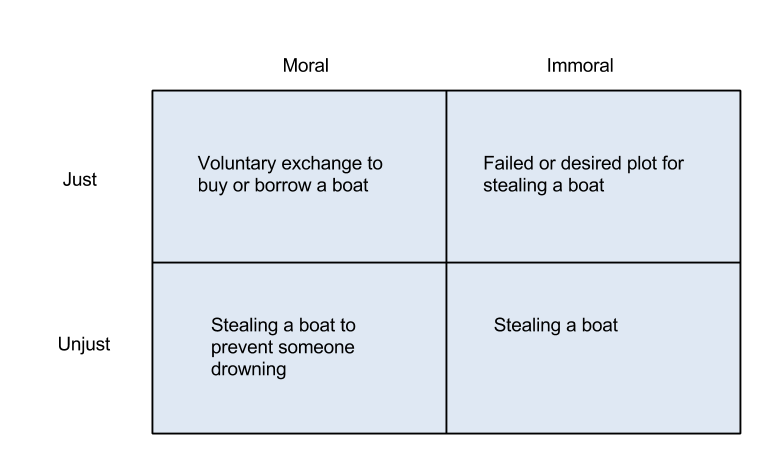There’s a lot of discussion about whether particular policies or outcomes are just or moral. Often the terms are used synonymously or never really defined or distinguished.
I have written about what I see as crucial and fundamental differences between justice and morality in this post. I claim that justice is public and subjective – an emergent phenomena to deal with conflict and coordinate peace – while morality is private and objective – and internal compass to deal with self-regulation and coordinate peace of mind.
“Justice is about living with other people, while morality is about living with yourself. Justice is about right relation to others as measured against the mores of society, while morality is about right relation to right itself, as measured against your own beliefs”
To further illustrate what I mean by this, here’s a matrix showing four actions and where they might stand in relation to justice and morality:
Just-Moral is pretty easy to accept and needs little clarification. No parties are harmed and the actor feels no guilt. We’re assuming this action was not in violation to any belief or commitment to abstain from boat-buying on the part of the buyer.
Just-Immoral depends more on your own beliefs about right and wrong, but regardless of belief systems or acceptance/rejection of any divine or natural morality, all humans have a sense of guilt. The just-immoral quadrant is for those actions that cause no one else any harm, but harm the actor by giving him/her a sense of guilt and wrongdoing, regardless of its origin. The point is that the act feels wrong to the actor, and they in fact believe it to be wrong.
Moral-Unjust is when an act clearly causes harm to someone even though the actor feels complete confidence it was the right thing to do. Justice, in service to maintaining cooperation and peace, might demand recompense, but no guilty feelings are associated with the action. Third parties observing may be inspired by the morality of the action, but to conflate that with justice is unfair to the harmed party.
Immoral-Unjust is pretty easy as well. A party was wronged and the actor violated conscience or belief in right/wrong.
These examples may be flawed, but I think the fact that justice and morality are not the same thing is incredibly important. When they become conflated, and far worse when either become conflated with government edict, moral atrocities and grave injustices unfold on small and large scales.
The key for both is an open, spontaneous, evolving system of give and take – a market for norms and institutions – rather than a tightly defined universal and centralized enforcement. Common law and basic manners are good examples of this, whereas criminal law and legislation are the opposite.
